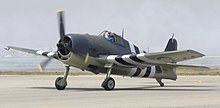709 Naval Air Squadron
| 709 Naval Air Squadron | |
|---|---|
| Active | 15 September 1944 - 26 January 1946[1] |
| Country | |
| Branch | |
| Type | Fleet Air Arm Second Line Squadron |
| Role | Ground Attack School |
| Size | Squadron |
| Part of | Fleet Air Arm |
| Home station | RNAS St Merryn |
| Insignia | |
| Identification Markings | S5A+[2] |
| Aircraft flown | |
| Fighter | |

709 Naval Air Squadron (709 NAS) was a Fleet Air Arm (FAA) naval air squadron of the United Kingdom’s Royal Navy (RN) which last disbanded during January 1946. It formed in September 1944 within the School of Naval Air Warfare as the Ground Attack School using both the British Supermarine Seafire and the American Grumman Hellcat fighter aircraft for training. The squadron spent its whole sixteen month existence based at HMS Vulture, Royal Naval Air Station St. Merryn.
History of 709 NAS
[edit]Ground Attack School (1944 - 1946)
[edit]709 Naval Air Squadron formed at RNAS St Merryn (HMS Vulture) on 15 September 1944, as part of the School of Naval Air Warfare.[2] It was tasked as the Ground Attack School.[3] The squadron was initially equipped with Supermarine Seafire L Mk III. These were a navalised version of the Supermarine Spitfire fighter aircraft, adapted for operation from an aircraft carrier.[2] The Supermarine Seafire aircraft had previously belonged to both 808 and 885 Naval Air Squadrons of the Fleet Air Arm’s 3rd Naval Fighter Wing, which was in the process of converting to Grumman Hellcat fighter aircraft.[3]
The School also operated Grumman Hellcat, an American carrier-based fighter aircraft. These aircraft were used in training to apply lessons learned by the 3rd Naval Fighter Wing during the Normandy invasion. 709 Naval Air Squadron disbanded at RNAS St Merryn (HMS Vulture) during January 1946.[2][3]
Aircraft operated
[edit]
709 Naval Air Squadron operated a couple of different aircraft types and variants:[3]
- Grumman Hellcat F. Mk. I fighter aircraft (September 1944 - January 1946)
- Grumman Hellcat F. Mk. II fighter aircraft (September 1994 - September 1945)
- Supermarine Seafire L Mk III fighter aircraft (September 1944 - January 1946)
- Supermarine Seafire F Mk XV fighter aircraft (October 1945 - January 1946)
- Supermarine Seafire F Mk XVII fighter aircraft (December 1945 - January 1946)
- Supermarine Seafire F Mk 45 fighter aircraft (December 1945 - January 1946)
Naval air stations
[edit]709 Naval Air Squadron operated from a single naval air station of the Royal Navy, located in England, throughout its existence:[4]
- Royal Naval Air Station St Merryn (HMS Vulture) (15 September 1944 - 26 January 1946)
- disbanded (26 January 1946)
Commanding Officers
[edit]List of commanding officers of 709 Naval Air Squadron with date, month and year of appointment.[3]
- Lieutenant Commander W.C. Simpson, DSC, RNVR, from 15 September 1944 (Commander 1 March 1945)
- Lieutenant Commander D.B. Law, DSC, RN, from 5 January 1946
- disbanded - 26 January 1946
References
[edit]Citations
[edit]- ^ Sturtivant & Ballance 1994, p. 31.
- ^ a b c d Wragg 2019, p. 114.
- ^ a b c d e Ballance, Howard & Sturtivant 2016, p. 18.
- ^ Ballance, Howard & Sturtivant 2016, p. 17.
Bibliography
[edit]- Ballance, Theo; Howard, Lee; Sturtivant, Ray (2016). The Squadrons and Units of the Fleet Air Arm. Air Britain Historians Limited. ISBN 978-0-85130-489-2.
- Sturtivant, R; Ballance, T (1994). The Squadrons of The Fleet Air Arm. Tonbridge, Kent, UK: Air-Britain (Historians) Ltd. ISBN 0-85130-223-8.
- Wragg, David (2019). The Fleet Air Arm Handbook 1939-1945. Cheltenham, Gloucestershire, UK: The History Press. ISBN 978-0-7509-9303-6.
